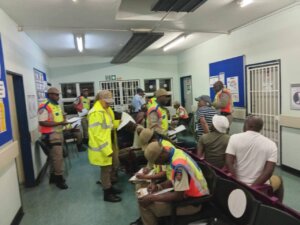For as long as I can remember, I’ve been terrified of the thought of death. As a child, the fear was all-consuming: I dreaded the dark, avoided funerals, and panicked at any movie scene that hinted at loss or burial. The very sight of a coffin would send my imagination into a spiral of anxiety and sleepless nights.
I remember telling my parents without shame, that if either of them passed, someone would have to drug me just to get me to their funeral. I was serious. I insisted they understand I wouldn’t be able to attend. But then…I grew up.
I came to realise that death, loss, and grief are inevitable companions to life and love. I began to understand the beauty of being alive and the gift each of us brings to this world. Saying goodbye, no matter how painful, is part of the human experience.
I also discovered that my thoughts do not influence the beginning or end of someone’s life. As a child, I once believed I had that power. When my cousin passed away in a tragic car accident, I was haunted by the fact that I had thought of her just days before, imagining everyone crying. In my young mind, I thought I had caused it by thinking it. The guilt was heavy, and my fear of death deepened.
Through the years, I lost more loved ones and stayed true to my word. I wouldn’t go to funerals. I called it a phobia, and nobody pressed me further. Until, again, I grew up.
My first memory of a funeral was when I was five. My mother’s brother died during a church service. We were a close-knit family my cousins and I were born the same year and called ourselves “triplets.” I sat with them that day, too young to fully grasp the weight of what had happened. Doing what is expected of children, to be seen and not heard. Years later, I travelled to the Eastern Cape for another uncle’s funeral—back then, part of the Transkei. The road trip took over 12 hours, through border crossings and long dusty roads. That same uncle had wept uncontrollably at his brother’s funeral years earlier. I remember my cousins singing, the grandeur of the service, the heartbreak. He was a pastor, honoured with a significant send-off. Time and age started to make sense, but…
Even then, I told myself: Never. I will never be able to do this willingly.
How terrifying it is to lower someone you love into the ground. That thought haunted my very soul. But again…I grew up.
As an adult, there’s no hiding from love, from memories, from responsibilities, or from the pain of loss. Eventually, I had to accept the hardest truth: with life comes death. With love comes grief. And how we navigate that grief determines how we carry on. In counselling, we speak about the five stages of grief: denial, anger, bargaining, depression, and acceptance. But in truth, these stages aren’t linear. They don’t come in order. You can experience all five in a single day—or cycle through them for years. And sometimes, we never fully “accept.” We just learn to carry the weight differently.
Denial is that first, hollow refusal. You hear the news and your mind rejects it. Even as you attend the funeral, a part of you insists: This isn’t real. They’re not really gone.
Anger bubbles up next. Anger at the world, at God, at life itself. Anger that this person, this light in your world, was taken.
Bargaining follows. You plead silently with God, the universe, fate: If I could just have one more day… if I had only said this… if I could turn back time.
Depression seeps in slowly. The pain becomes your constant companion. You move through life, but everything feels muted. Existing, not living.
Acceptance, when it comes, is not a finish line. It’s simply a softer place, where the memory no longer cripples you. Where you can speak their name without breaking. But even then, some days, you still break.
There is no right way to grieve. No timeline. No textbook definition. We all experience loss differently, and we all carry it differently.
In my journey, I’ve met remarkable people, walking through life with broken hearts and brave faces. I’ve seen mothers who smile, even though their child’s laughter echoes in memory. I’ve sat beside a friend keeping vigil over a premature baby clinging to life. I’ve watched daughters care for frail, fading parents, holding in their tears while whispering silent goodbyes. We all know someone grieving. We work with them, live with them, love them. And we often don’t realise where they are in their journey. That’s why we must choose compassion. We must give people room to feel to heal. You may meet someone on their worst day and never know it.
Now that I’ve grown up, I speak about life and death openly. I’m comforted by my faith; a belief in eternal life that tells me death is not the end. But even for those with different beliefs, I hope you find solace in this truth: If you have loved deeply, you have lived fully. And in that love, there is always hope. Hope that you’ll smile again. Hope that you’ll find joy again. Hope that, someday, you’ll meet again.
I lost an ex-boyfriend to COVID-19. I lost a close girlfriend, too. The grief hit hard and still does. Sometimes I cry when I think of them. Other times, I smile at the memories. That’s the thing about grief it comes in waves. You never quite “get over it.” But you can live through it.
So, give grief time.
I now understand what “time heals” really means. It doesn’t mean pain disappears. It means time gives us space. Time allows us to breathe, to find meaning, to make peace.
If you are grieving, I hope you give yourself that time. If you love someone, talk to them. Don’t wait. And if you are planning your own farewell, consider having those conversations now; especially here in South Africa, where the cost of burial is so high. Too often, we avoid these talks because we’re afraid. But silence adds suffering. Talk to your children, your partner, your family. Prepare them, gently. We avoid these conversations because they feel taboo, but there is power in talking. There is healing in sharing. You can save your loved ones the pain of planning and the freedom to be free to grieve.
This weekend the twins bury their mom. For us triplets over 40 years later. We not as close and life has taken us in different directions. Yet here we are. Adults, saying goodbye once again. I don’t believe the grief is the same as it was then, but young or old, parent or child, grief is still felt. Acutely.
May this writing give you a moment of pause. A chance to reflect. A reminder that love and loss are two sides of the same coin and both are worth feeling, fully. Because in the end, our ability to grieve is proof that we have loved and what we have once enjoyed, we can never lose. All that we love deeply becomes a part of us.
And that’s a beautiful thing.








